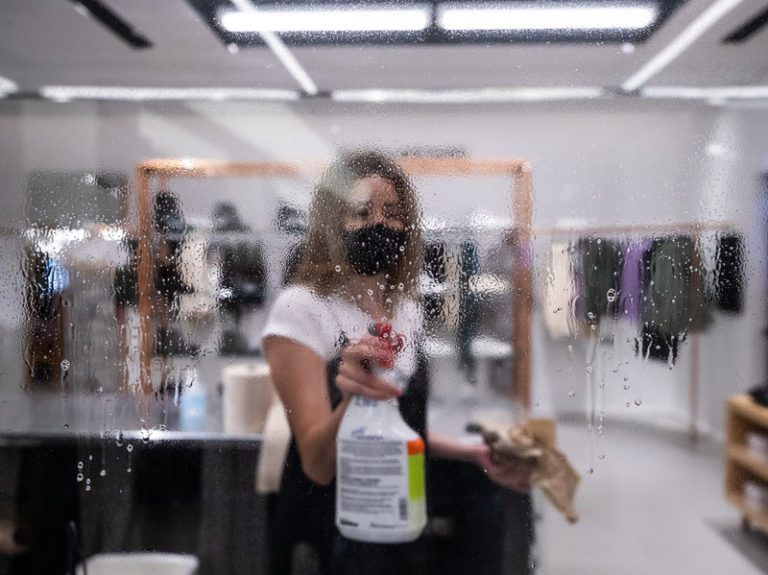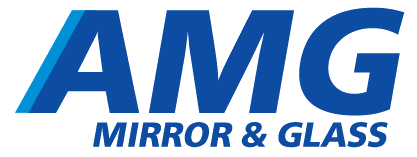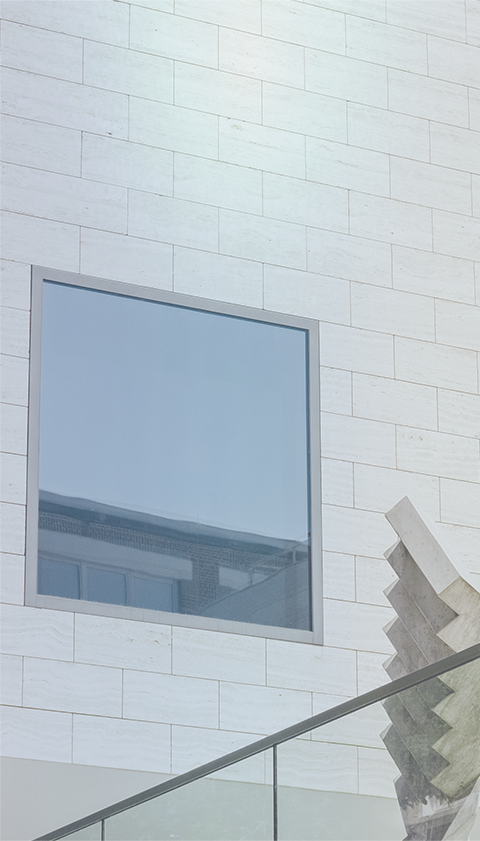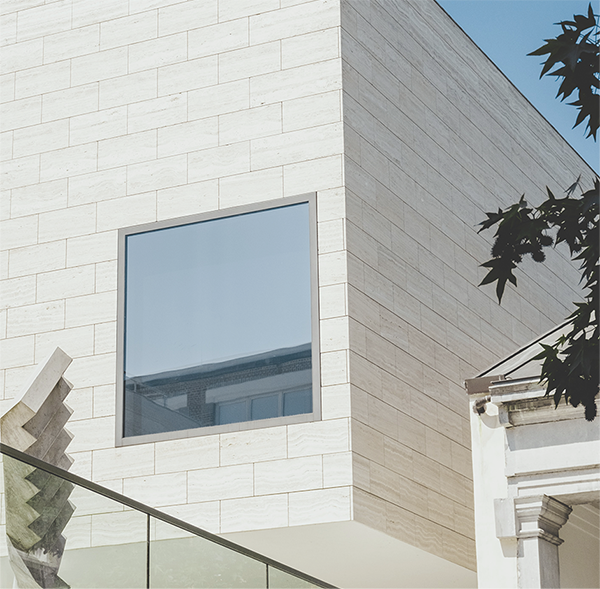Sneeze guards will be familiar to anyone who has been in a buffet, salad bar, or self-serve restaurant. However, during the 2020-2021 pandemic, they have become a vital part of our strategy in the public battle against COVID-19.
Dining areas, cash registers, schools, offices and other public places now use sneeze guards to protect staff and customers from spreading the virus.
At AMG Mirror & Glass, we’ve installed sneeze guards and shields in dozens of business across Durham and the GTA. Below, you’ll find answers to many of the common questions we get from customers. Let’s get started!
What Is a Sneeze Gaurd?
Sneeze guards — also called sneeze barrier shields — are partitions initially used by the food industry to separate humans from food.
They are generally made from plastic, glass, or clear acrylic. These barriers provide a great way to protect unpackaged foods from air-borne contaminants that customers or staff can spread through sneezing or coughing.

Why sneeze guards are not just a trend but here to stay
When COVID-19 began spreading worldwide, sneeze guards became necessary to protect customers and staff in essential businesses not affected by lockdowns. Sneeze guards, masks, and social distancing are protective measures that have become a part of our lives.
However, COVID-19 will be with us for the foreseeable future. The Delta variant is more contagious than previous strains. Infected individuals can spread the virus for around two days before they show symptoms. More worryingly, even vaccinated individuals can still get and spread coronavirus in what is known as “breakthrough infections.”
Many scientists and thought leaders have warned us about the risk of zoonotic infections in recent years. The World Health Organization suggests that influenza or other viral diseases are among the top ten threats to our public health. In the U.S., the Centers for Disease Control and Prevention (CDC) estimate that 75% of new infectious diseases in humans come from animals.
As we deal with and try to contain one pandemic that is mutating and potentially becoming immune to our current vaccines, we must also be alert to the threat of other pandemics. Over the last 30 years or so, infectious disease outbreaks have happened with concerning regularity.
Businesses and the broader population need to learn our lessons from this pandemic. Governments need to stay prepared. Much of the infrastructure and measures that popped up to fight the virus are here to stay, including sneeze guards.
That means your investment in sneeze guards is not only worth it, but vital!
How do Sneeze Guards Work?
Like other personal protective equipment (PPE), the purpose of sneeze guards is to slow the transmission of the virus. While there haven’t been conclusive studies that give us exact numbers to work with, there are some interesting data out there.
Some research into sneeze guard’s effectiveness on airplanes suggests that shields could help lower the inhalation rate of aerosol particles by up to 70%. Additionally, the study estimates that sneeze guards would reduce droplets deposited on passengers’ bodies and clothes by around 45%.
Per the WHO, coronavirus and other infectious diseases spread through the air by people coughing and sneezing. Sneeze guards provide a protective barrier that blocks air-borne particles from spreading while employees and staff interact.
Is it worth upgrading your sneeze guards?
At the beginning of the pandemic, many businesses were caught off guard. In a bid to meet public safety requirements, they scrambled to find solutions. Many companies installed plexiglass or plastic sneeze guards as a temporary measure.
However, faced with the reality that COVID-19 will be with us for a long time, many businesses are transitioning to more permanent measures. As work from home comes to an end across many industries and employees are welcomed back, it’s not just public-facing workplaces that could do with an upgrade.
Finally, while plastic or plexiglass shields were fine during the initial stages of grappling with the pandemic, they can look out of place in professional environments. Upgrading to a well-designed glass shield will fit better with the aesthetic of a modern office.
What Type of Businesses and Locations Use Sneeze Guards?
Sneeze guards are essential for public-facing businesses because they halt and slow down the spread of germs between customers and employees. However, as lockdown restrictions are eased, many companies are calling staff back from work-from-home arrangements.
Many workers are understandably concerned about returning to offices. Commuting and working in cramped offices are a world away from the social distancing rules that we have all implemented to slow down the spread of coronavirus.
As a result, there are a wide variety of businesses and other locations that are using and installing sneeze guards.
These include:
Restaurants, Bars, Buffets & Bakeries
The food and hospitality industries were some of the hardest hit by COVID-19 lockdown measures. Reopening and recovery require vigilance, with many bars and restaurants choosing to keep or install sneeze guards.
These guards can mitigate the risk of infections for both customers and staff. Additionally, they help customers feel safer.
Of course, in buffet and salad bars, sneeze guards have been a regulatory requirement for years.
Retail Stores
Many grocery and retail stores, from big chains to smaller mom-and-pop businesses, installed protective screens during the COVID outbreak. Protecting front-line workers is a priority. Retailers with significant foot traffic are in a high-risk category, so sneeze guards help reduce the spread of the virus and germs between staff and customers.
Doctor’s Offices and Pharmacies
Doctor’s offices and pharmacies are other venues that can benefit from sneeze guards. While COVID might be the primary concern, both places accommodate a stream of sick or infected people with a wide range of illnesses. Again, reception staff and healthcare workers can benefit from reduced exposure.
Reception Desks
Reception desks for various businesses and offices are benefiting from fitting sneeze guards. Hotels, banks, corporate offices, and even hair and nail salons can implement these barriers to mitigate the risks caused when greeting customers or processing transactions.
Transport
For many years, Buses, taxis, and limos have used plexiglass to provide a protective barrier between drivers and customers. Now, drivers for rideshare apps like Uber, Poparide, and Lyft are installing this extra measure within their vehicles.
With many people getting in and out of a cab and many rides lasting 15 minutes or more, sneeze guards can help lower the risk of infection.
Gas Stations
Gas stations are another public service with heavy foot traffic that requires people to touch pumps and credit card readers. The risk of infection between the population is therefore increased. However, many stations have installed guards at their pumps. These shields protect the credit card readers, meaning fewer germs are spread.
Gyms and Fitness Clubs
Gyms and fitness clubs were heavily affected by the coronavirus lockdowns. Many were forced to shut their doors because of the high risks they posed with people exercising and running in confined spaces.
As these facilities are reopening, their check-in counters have moved behind glass. Additionally, some fitness centres are using sneeze guards between machines.
Schools
Schools are another high-risk public area due to the difficulty with practising social distancing. Small rooms filled with 20-30 people represent a high risk of contagion. Administrative offices are being fitted with sneeze guards, as well as teacher’s desks.
Sneeze Guards Keep Your Employees, Guests, and Customers Safe
COVID-19 is something that we’ll be dealing with for a long time. New variants will evolve, rendering current vaccines ineffective. Additionally, experts suggest there will be other pandemics in the future.
To stay operational, businesses and services should consider permanent sneeze guards. Protecting staff and employees is incredibly important to mitigate the risks and slow the transmission of the virus and other illnesses.
To find out more and get a quote, contact AMG Mirror & Glass, and speak to one of our specialists about the best Durham region sneeze guard solutions


